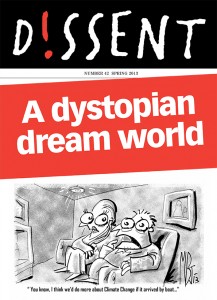Edition Number: 42
Spring 2013
Click on Login (existing subscribers)
For those people wishing to print out the entire magazine a PDF copy may be downloaded by pressing the button below. For those people wishing to read the magazine directly on their computer or tablet screen, follow the link below against each individual article to view that article in a format best meeting their needs.
Download this edition as a PDF
A dystopian dream world
Editorial: Australia is one of the richest countries in the world. The number of asylum seekers arriving by boat are less than 1.5% of new migrants and yet Australians are living in a dystopian dream world in which they believe living standards are falling, we can’t afford a carbon tax and we are being swamped by boat people. Politicians are expected to empathise with these perceptions so that it is impossible to undertake measures to decarbonise the economy. Even if global warming is limited to 2 degrees, the increased frequency of extreme weather threatens the largest refugee crisis in history. In SE Asia about one third of the population are living in areas considered at risk.
The micro-liberal institution
Charles Livingstone describes how both the private health insurance industry and the social clubs claim status as community builders based on their communitarian roots, but both now seriously impair national wellbeing.
A new approach to health care funding arrangements
Ian McAuley and Jennifer Doggett explain that the Intergenerational Report’s argument that we must cut government spending on health care because it is unaffordable has no logical basis. It would be useful if the report covered public and private spending on health but in its present form it is no more than a shallow fiscal projection laying the ground work for cost shifting – as if the interests of the government and the community which elects it are separate.
The Coalition and industrial relations in 2013 and beyond
Ron McCallum argues that the Coalition’s industrial relations policy recommendations are mild and indeed beneficial, but the policy leaves the door open for further a further deregulatory assault on our labour laws which Mr Abbott may find difficult to resist.
The defenders of privilege in education are on the counter-attack
Trevor Cobbold unpicks the flawed logic and factually incorrect arguments being advanced to undermine the key recommendations in the Gonski report on school funding which has switched the debate from prioritising school choice and supporting privilege to a new model which promises more resources for under-resourced schools and disadvantaged students.
Time for a radical reversal of transport priorities
Paul Mees and Lucy Groenhart contend that Australian cities should be planning for European-style public transport service quality making virtually all planned urban road investment redundant. We do not need to wait until planning policies deliver European level densities before we can have European-style public transport.
Tribute to Paul Mees
Dr Paul Mees died from cancer aged 52 on 19 June 2013. Formerly an industrial lawyer, Paul was a tireless and articulate advocate for public transport both as president of the Public Transport Users Association (1992-2001) and as an academic. He was internationally recognised for his work in transport planning through his books and research papers. Here in Australia, Paul consistently called governments to account and he influenced policy developments in urban planning through both his scholarly contributions and his longstanding engagement in public debates. His untimely death is a great loss to public transport advocacy and we are proud to have published articles by him in D!SSENT.
Kenneth Davidson and Lesley Vick – Eds.
Into the abyss
John Legge traces the history of neoliberalism to show how its ideas helped create, and were then exposed as false, by the GFC.
Absurd, obscene and reckless – American nuclear weapons in the defence of Australia
Richard Tanter claims that the long-proclaimed government strategic policy reliance on the US nuclear deterrence in the defence of Australia is absurd, obscene and reckless. He points out no nuclear threat has ever been officially identified, other than that derived from hosting Pine Gap and North West Cape.
When No means No: Indonesia and Tony Abbott’s asylum boat policy
Derek Woolner points out the Coalition policy to send boat people back to Indonesia has become a problem transcending Indonesia. It drags in all South East Asia and could lead to a counterproductive loss of many other agendas important to Australia.
Australia and New Zealand are soft theocracies
Max Wallace says the most accurate way to describe the relationship between government and religion in Australia and New Zealand is ‘soft theocracies’ where church and government purposes coincide to garnishee taxpayers’ money and resources – structurally through tax exemptions and functionally through grants and privileges.
The hurdles in accessing the legal system for the disadvantaged
Liz Curran points to the chronic underfunding of legal aid services over the past decade and recent discussions about narrowing the range of services offered fail to recognise the ongoing social and economic costs if this policy is adopted.
DISSENT magazine’s thoughtful and critical discussion of public affairs includes social and economic policy, education, politics, science and the environment, cultural matters, media and the arts. Read More

Thinking about subscribing?
Read a sample article from a previous issue here.


